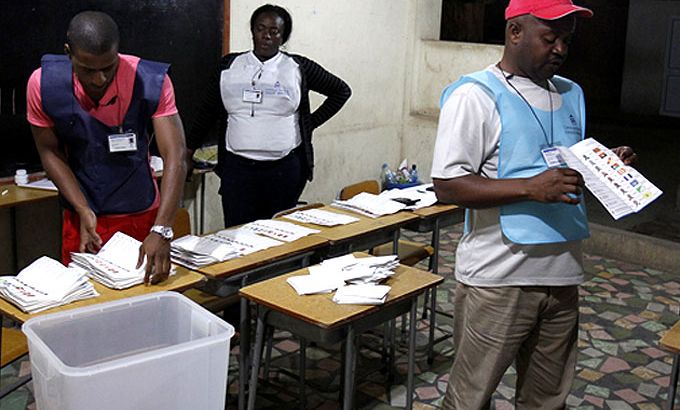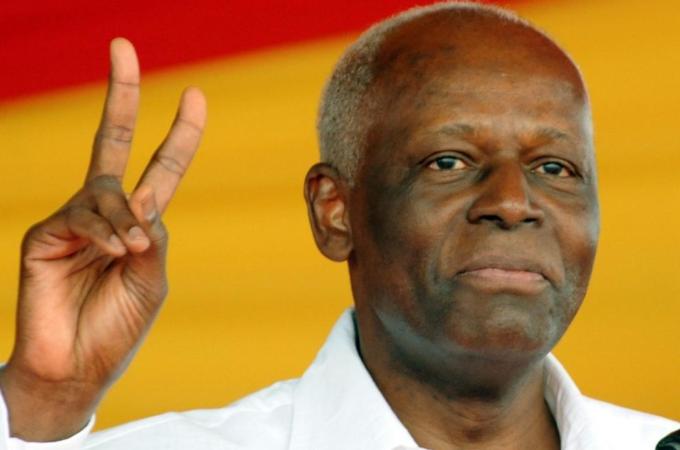Polls close in Angola general election
Voting ends peacefully in southern African nation amid complaints of possible fraud and reports of low voter turnout.

Voting has ended peacefully in Angola in only the country’s second national election since the end of a 27-year civil war, despite complaints from the country’s opposition about the authenticity of the voter roll and a poor voter turnout.
Electoral officials on Saturday were tallying the ballots in Angola’s third polls since independence in 1975, with the first results expected late in the day.
President Jose Eduardo dos Santos is widely expected to win the election, which was constantly postponed until last year, when the government changed the constitution so that the leader of the party with the most votes becomes president.
| IN DEPTH | ||||||||
|
Voters on Friday were electing politicians for the 220-seat parliament.
Pedro Verona Pires, chief of the African Union’s observer team, described the organisation of the election as “satisfactory” compared to the country’s previous election in 2008.
“Everyone agrees that the elections this year were better organised than in 2008,” Pires, who is also the former president of Cape Verde, told the AFP news agency.
However, the country’s main opposition party, the Union for the Total Independence of Angola (UNITA), and the new coalition opposition party, Broad Convergence for Angola’s Salvation (CASA-CE) had complained of the uneven playing field in the election and the possibilities for fraud.
The parties said on Friday that not all of their monitors were allowed into the polling stations.
Speaking on Thursday, Isaias Samakuva, the leader of UNITA, said: “Many Angolans’ names don’t appear on the voter roll, and in many places the voter roll has not been released.”
Opposition parties are also concerned that votes will not be counted until they reach the National Electoral Commission in Luanda, where soldiers in the Military Affairs Cabinet, which reports directly to the president’s office, have been stationed.
Poor turnout
More than 10,000 polling stations were set up at schools across the country, but the AP news agency reported that thousands of people had not turned up to vote.
“Thousands of people are unable to vote,” Elias Isaac of the Open Society Initiative of Southern Africa told AP. “The whole system was created to exclude people rather than including as many as possible.”
Isaac also said that the government had confused voters with a lack of information and had excluded local election observers, from critical civil society organisations, from the process.
Two hours before polls were to close, two stations reported only about half the registered voters had cast ballots, reported AP.
The news agency also reported that some voting stations in the country, twice the size of France, had opened late.
The website of an underground youth movement that has been protesting for a change of government reported people were protesting at one Luanda station because their names had been transferred to distant provinces and “many are
returning to their houses without any possibility to vote”.
In 2008 elections, deemed legitimate by observers despite the troubles at some polling stations, 87 per cent of voters participated.
Wage promise
Preliminary results are expected by Saturday, the ANGOP state news agency said, with dos Santos widely expected to will extend his 33-year rule.
 |
| Dos Santos is widely expected to extend his 33-year rule [AFP] |
This is the country’s third national election since Angola won independence from Portugal in 1975, and the second since the end a decade ago of a 27-year civil war.
Victory for the ruling Popular Movement for the Liberation of Angola, or MPLA, would give dos Santos another five-year term.
Dos Santos’ party currently holds 191 national assembly seats.
UNITA is expected to pick up a few more votes from people who complain about a lack of democracy and an unequal spread of wealth.
While the new splinter coalition party CASA-CE, formed by ex-UNITA leader Abel Chivukuvuku and former MPLA general Andre Gaspar Mendes de Carvalho, is expected to come in third place, with promises to raise the minimum wage from less than $100 to $500 and to set up an agency to fight corruption.
Shanty towns
This southern African nation was a Cold War battlefield until 2002, with dos Santos’ MPLA backed by Cuban soldiers and a Soviet war chest, pitted against UNITA, which was backed by apartheid South Africa and the US.
Half a million people died in the war, while more than four million, a third of the population, were displaced and much infrastructure was destroyed.
Since the war ended in 2002, Angola has dominated the list of the world’s fastest growing economies and is sub-Saharan Africa’s second-largest oil producer, after Nigeria, fueling a building boom of houses, hospitals, schools, roads and bridges.
But 87 per cent of urban Angolans live in shanty towns, often with no access to clean water, according to UNICEF, and more than a third of Angolans live below the poverty line.